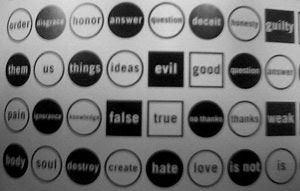character development: duality

Like my wife says, we are all contradictions in terms. This is something to keep in mind when developing characters for a story, be it for your short speculative fiction, your Great Filipino Novel, your action-adventure screenplay or your epic fantasy animated TV series.
As people, we are capable of the noblest of intentions and the most unspeakable of thoughts. We love and hate, admire and envy, build and tear down, laugh at adversity and weep at the thought of injustice. Sometimes, we appreciate the beauty of simple things; sometimes we can’t be bothered to wake up to watch the sun rise. We are busy and self-centered, humble and giving of our time, selfish and ignorant, free and wise. Within each person is the ability to choose his attitude for any given circumstance, or instead be swept away, unable to cope with the situation.
Every person you see is a walking trove of stories, a living contradiction. Certainly not all of them have experiences akin to a Templar revelation, but there are many smaller stories within their frames, conversations with lovers and enemies, dreams of wealth and betterment, secret passions and activities unseen, techniques for bargaining with vendors and ways to deal with corrupt policemen, multiple travelogues of places visited, foreign words and phrases that mean more than their connotations, vespertine romances and remarkable dalliances, jeremiads of lost loved ones and the usual megillah about ungrateful friends – most seemingly prosaic, but beneath the superficies are narratives of the human condition. There are stories in everyone: your parents, your employer, the man next door, the librarian, the person across from you in the bus, the receptionist who greets you everyday, everyone. And, of course, you.
Fiction mines the lives of people, their flaws and fears, their loves and hopes, their small moments of joy and sorrow. Writers expose dualities, the inherent blemishes that make people interesting. Texts abound with both hero and anti-hero, and the protagonist is not necessarily a perfect person (if she was, she’d be boring to read). What happens in terms of plot is secondary if you focus on character and write character-driven narratives. These are the characters that are memorable to reader because they struggle to understand what’s going on, striving to live within the boundaries of the pages to the best of their abilities. Sometimes they succeed, sometimes they don’t, but it is how they react to the struggle that exposes their natures, that makes them living beings that the reader can root for or at least identify with.
So, where do ideas for characters come from? Honestly, ideas for characters are as common as dirt. A writing workshop or an evening out with friends can generate more than you can immediately use. For the role-playing games I run, I’ve developed numerous interesting characters through the years. The best resource? The people around you. So are good characters, like good ideas, rare? I believe in the old adage that says there is nothing new under the sun. Stories, like the ideas within them and the characters that inhabit them, are as old as the first dreams of man. We reinvent them and express them in new ways that are relevant to us as storytellers in this day and age, as well as to our purpose in telling the story.
How can textured characters be developed in a matter of pages or paragraphs? By exploring their duality: giving them flaws to deal with as they seek to achieve their goals. An easy temptation is to caricature or stereotype, placing characterization low on the totem pole of priorities and giving the privileged position to the idea. A quick common method by lazy writer is to resort to the Archetype and leave it at that*. This results in flat, uninteresting characters that speak the same way and react predictably, stultifying the reader with personalities that are the equivalent of a brown paper bag. This is laziness, pure and simple.
Consider duality as you write your characters: think of your characters as real people and think of the people you know as characters, then bring the interesting things you learn to the page.
______
* Joseph Campbell is much abused in this regard. His observations of Archetypes are not meant to be used like cardboard cutouts**. They are unconscious representations that populated myth and legend. You do not deliberately create something unconscious. It remains an interesting critical method though.
**This is also a sad flaw of most role-playing game systems – the reliance on Archetypes. This has led to poor creative writing from fantasy writers whose exposure to character creation is with the rulebooks of the games they played (from the distant past all the way to the revised White Wolf and d20 games). Better to draw from real life or (gasp) literature.


0 Comments:
Post a Comment
Subscribe to Post Comments [Atom]
<< Home